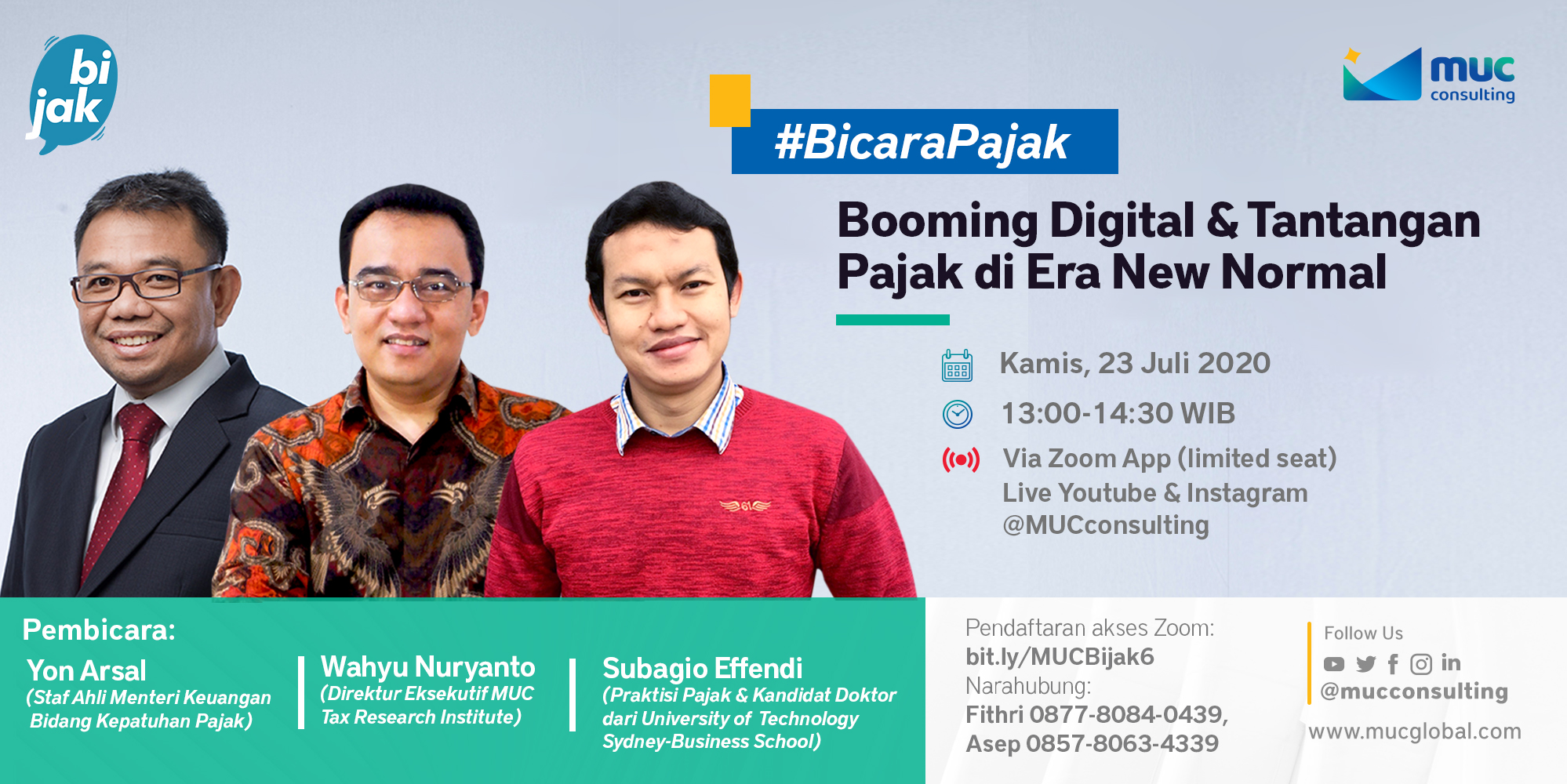MUCBijak 6: Government Efforts to Optimize Revenue from the Digital Sector and Its Challenges
Tuesday, 28 July 2020

In the midst of the Covid-19 pandemic, the challenge of tax revenue is still quite tough. On the one hand, taxes must contribute to economic growth which is persistently under pressure. Meanwhile, on the other hand, taxes must also be able to maintain revenue related to its function as the main instrument of state financing.
One of government's efforts to increase the revenue amid this sluggish and even stalled business condition is to target sectors that are experiencing rapid growth in current condition. It is digital sector. This matter was raised in the #MUCBijak tax discussion with the theme "Digital Boom and Tax Challenges in the New Normal Era.
This sixth edition of #MUCBijak features three main speakers. Among them are Assistance of the Minister of Finance for Tax Compliance Yon Arsal, Executive Director of the MUC Tax Research Institute Wahyu Nuryanto, and Tax Practitioner and Doctoral Candidate at the University of Technology Sydney - Business School Subagio Effendi. In addition, the discussion was also attended by Meidijati, Head Section of VAT Regulation for Trade I, Directorate of Tax Regulations I, Directorate General of Taxes (DGT). The discussion which took place on Thursday, 23 July was hosted by two MUC Consulting Tax Consultants, Deo Damiani and MNK Ferby.
On that occasion, Yon Arsal revealed that there were three focuses of tax policy during a pandemic. The first is to support the demand side by maintaining people's purchasing power, one of which is through the Government-Borne (DTP) Income Tax Article (ITA) 21 facility. Then, maintain the production side by easing the business liquidity burden affected by tax facilities in the import sector. Lastly, encourage public participation in fighting the pandemic, including by providing additional tax deductions for medical equipment manufacturers and tax incentives for medical workers.
Yon continued, the tax challenge during the pandemic is very high. Apart from the economic slowdown, the provision of a number of incentives resulted in the erosion of the tax baseline. So the tax ratio has dropped further. "On the one hand we want to keep up with an optimal level of revenue, but on the other hand, the financing needs must be maintained," he said.
Therefore, Yon said, one of the government's efforts to optimize state revenue from taxes is to find new revenue bases. Among other things, the taxation on Trade Through Electronic Systems (Perdagangan Melalui Sistem Elektronik/PMSE). In the midst of this condition, the potential of the digital economy is huge. The business model of the digital economy is also growing rapidly. "That's why regulations also have to adjust quickly," he added.
For this reason, the government issued a Minister of Finance Regulation (PMK) Number 48 of 2020 which is a derivative rule of Government Regulation in Lieu of Law (Perppu) Number 1/2020. The PMK will be the basis for collecting, remitting and reporting VAT on digital products originating from abroad by PMSE business actors, namely foreign sellers/service providers, offshore PMSE operators, or domestic PMSE operators appointed by the Minister of Finance through the Director General of Taxes.
But so far, the PMK has only focused on collecting VAT for PSME business actors. According to the Head Section of VAT Regulation for Trade I, Directorate of Tax Regulations I, DGT Meidijati, other types of digital tax levies other than VAT are still waiting for the global consensus. "Income Tax for example, we are waiting for the final global consensus decision which hopefully can be reached by the end of this year," she added.
Executive Director of Muc Tax Research Institute Wahyu Nuryanto added that the government also needs to seek new revenue sources that are not only relevant to current condition. He explained that in normal conditions there are still many things that can be taxed (taxable) but have not been taxed. While related to the digital economy, he believes there are still some sectors that are not covered by digital taxes yet. "So these sectors or taxpayer group are not covered by the extensive program,"he said.
In addition, Wahyu also highlighted the level of public consumption which is still decreasing as a result of the pandemic, even though several public areas have reopened. Because consumption plays a very important role in the pace of the domestic economy, as well as the performance of tax revenue.
"VAT on consumption has a large contribution, even the largest included in tax revenue. For that reason the government must think about the right incentives to boost this consumption, "he added.
On the same occasion, Tax Practitioner and Doctoral Candidate at the University of Technology Sydney - Business School Subagio Effendi also revealed that a number of efforts made by the government regarding taxation are very comprehensive. These incentives are an attempt to expand the tax base. However, these efforts must be accompanied by maintaining the existing tax base. "Strengthen the tax base, reduce the size of the informal economy. People who have MSME businesses must formalize their businesses. So when the pandemic is over and their businesses are already profitable, they can be taxed," he explained.
For information, the #MUCBijak 6 program was carried out through the ZOOM application, and broadcasted live through various MUC Consulting social media platforms such as Youtube, Instagram and via Twitter in the form of a live tweet. To review the discussion, you can access it on the MUC Consulting youtube channel via the following link: https://www.youtube.com/watch?v=dw_IJhf-LWo. This program is also in collaboration with Butterfly Effect, which is a social movement initiated by MUC Consulting employees. (Ken)


